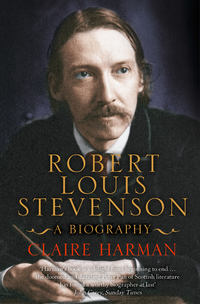
Robert Louis Stevenson: A Biography
It was very sad to see him there, in a little room with two beds, and a couple of sick children in the other bed; a girl came in to visit the children and played dominoes on the counterpane with them; the gas flared and crackled, the fire burned in a dull economical way; Stephen and I sat on a couple of chairs and the poor fellow sat up in his bed, with his hair and his beard all tangled, and talked as cheerfully as if he had been in a King’s Palace, or the great King’s Palace of the blue air. He has taught himself two languages since he has been lying there. I shall try to be of use to him.64
Henley’s intellectual energy, his enormous pleasure in talk and company, were evident from the first, as was his spirited response to his dire predicament and his tormentingly long stay in the hospital. Here was someone whom Louis could help, someone much worse off than himself, seriously ill, and without family or money. But the taint of patronage, which coloured the whole relationship, is also there from the start, with that rather priggish ‘I shall try to be of use to him.’ Stevenson’s second mention of Henley in his letters is to ‘my poet’, to Bob he called him ‘a poor ass in the infirmary’,65 and only a year later he was describing Henley to a woman he wanted to impress as his ‘pensioner in the hospital’.
The ‘poor ass’ had been writing some remarkable poems while laid up. Henley became famous later for poems that addressed the nation’s hunger for moral uplift, providing it with a classic text, ‘Invictus’, whose strongly accented rhythms and bracing sentiments have burned themselves into the popular imagination in the same way that Kipling’s ‘If –’ began to do two decades later:
It matters not how strait the gate
How charged with punishments the scroll,
I am the master of my fate
I am the captain of my soul.
‘Invictus’ was written in 1875 (and Stevenson must have been one of its first readers, for he was already quoting from it that year66), but the ‘In Hospital’ sequence, written at approximately the same time, was very different. ‘In Hospital’ included free-verse portraits of Dr Lister, the nurses, the house-surgeon, the ‘scrubber’ and others, and impressionistic poems such as ‘Waiting’ and ‘Interior’. The dismal experience of being a long-term patient in a dark backroom, where the dripping cistern is the only indication of time passing, is perfectly conveyed in ‘Pastoral’, ‘Nocturne’ and ‘Vigil’:
Lived on one’s back,
In the long hours of repose
Life is a practical nightmare
Hideous asleep or awake. 67
For the 1870s, when they were written, these poems were truly innovative, though by the time they were published in book form in 1888 Henley had given up writing in this vein.
One of the sequence, a sonnet called ‘Apparition’, is Henley’s often-quoted portrait of Stevenson that begins ‘Thin-legged! thinchested! slight unspeakably’, and ends:
A deal of Ariel, just a streak of Puck,
Much Antony, of Hamlet most of all,
And something of the Shorter Catechist. 68
But another of Henley’s poems about Stevenson, ‘Ballade, R.L.S.’, not published until 1974, gives a rather more intimate portrait of
An Ariel quick through all his veins
With sex and temperament and style;
All eloquence and balls and brains;
Heroic and also infantile.
The affectionately bantering tone carries right through the poem to ‘Wise, passionate, swaggering, puerile’ in the last stanza. The forthright, critical spirit that Henley displays here was the very thing that attracted Stevenson to him. Opinionated, quarrelsome, with his huge laugh and super-sized vitality, Henley was like a sharper and more inventive Baxter, a boon companion whose restless intelligence was a match for Stevenson’s own.
The friendship was cemented by Stevenson’s inspired plan to take Henley out of hospital on a couple of occasions in a carriage (probably the swanky Stevenson barouche, of which Thomas was very proud). To a passer-by it must have been peculiar to see the stick-thin, boyish Stevenson carrying a burly, bearded one-legged man down the long staircase of the Infirmary and staggering out to where the vehicle waited. They drove out of the city to see the new spring greenery and the cherry blossom, stopping on bridges ‘to let him enjoy the great cry of green that goes up to Heaven out of the river beds’:
he asked (more than once) ‘What noise is that?’ – ‘The water.’ – ‘O’ almost incredulously; and then quite a long while after: ‘Do you know the noise of the water astonished me very much.’69
Henley remembered these drives all his life with intense happiness, and celebrated them in the last poem of his ‘In Hospital’ sequence, ‘Discharged’:
Carry me out
Into the wind and the sunshine,
Into the beautiful world.
O, the wonder, the spell of the streets!
The stature and strength of the horses,
Конец ознакомительного фрагмента.
Текст предоставлен ООО «ЛитРес».
Прочитайте эту книгу целиком, купив полную легальную версию на ЛитРес.
Безопасно оплатить книгу можно банковской картой Visa, MasterCard, Maestro, со счета мобильного телефона, с платежного терминала, в салоне МТС или Связной, через PayPal, WebMoney, Яндекс.Деньги, QIWI Кошелек, бонусными картами или другим удобным Вам способом.
Вы ознакомились с фрагментом книги.
Для бесплатного чтения открыта только часть текста.
Приобретайте полный текст книги у нашего партнера:
Полная версия книги
